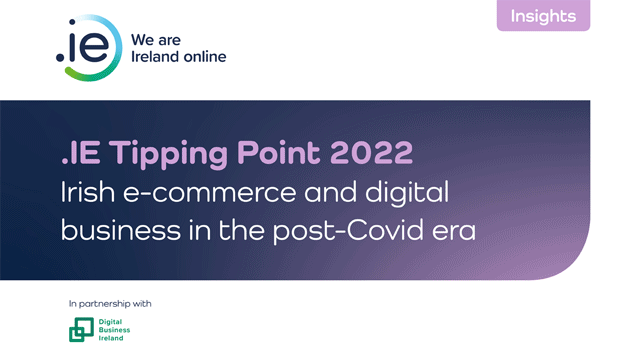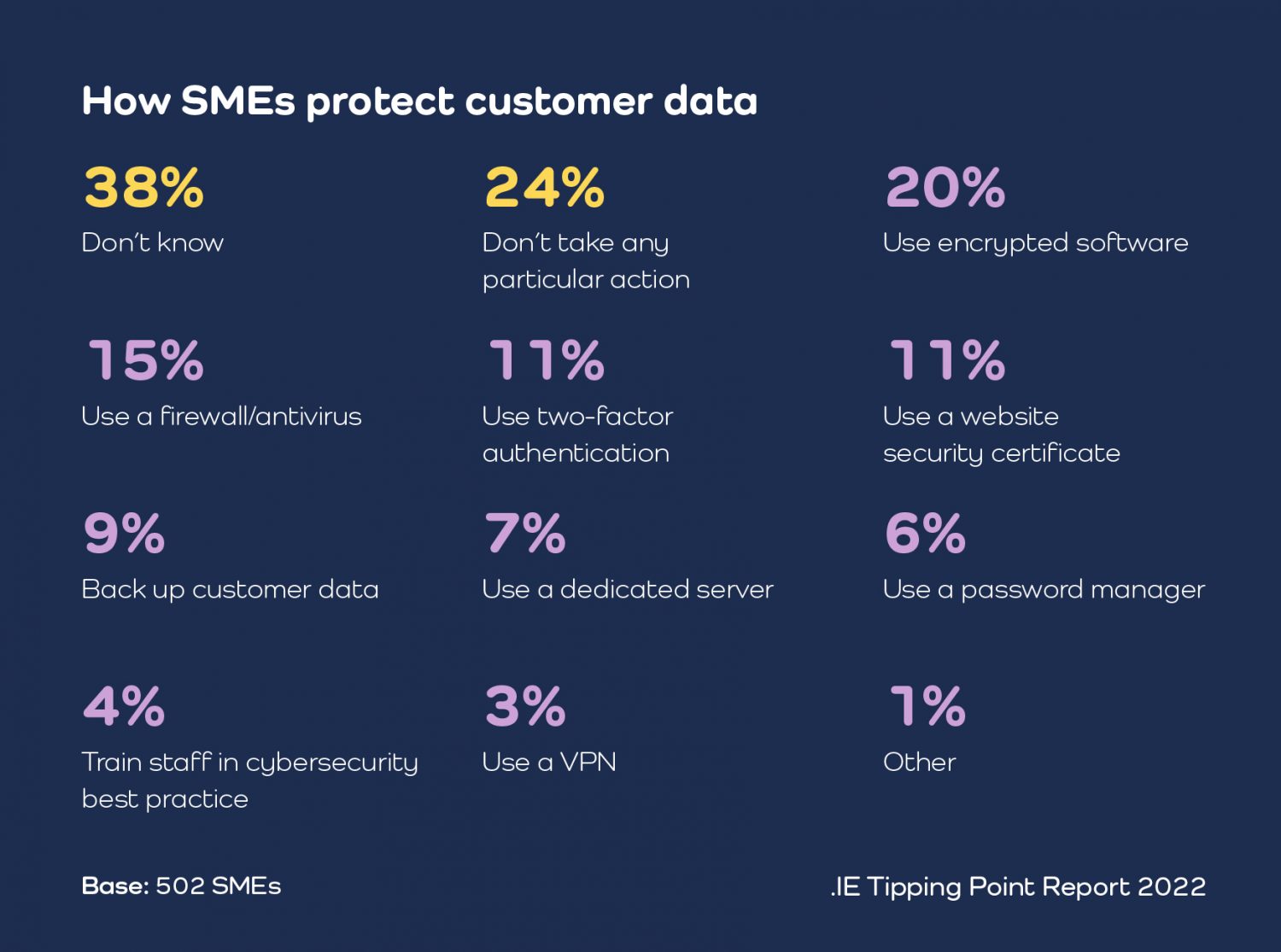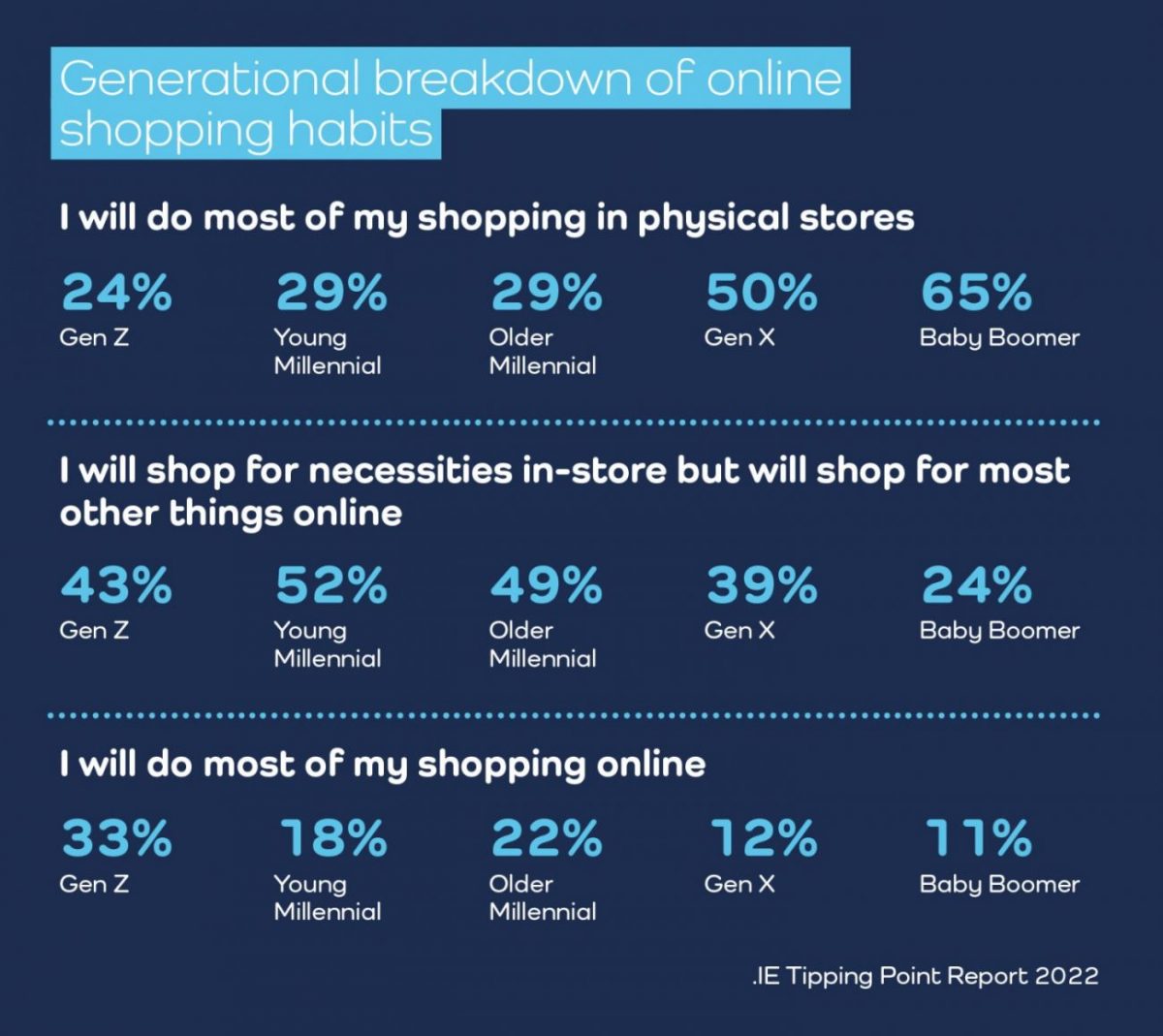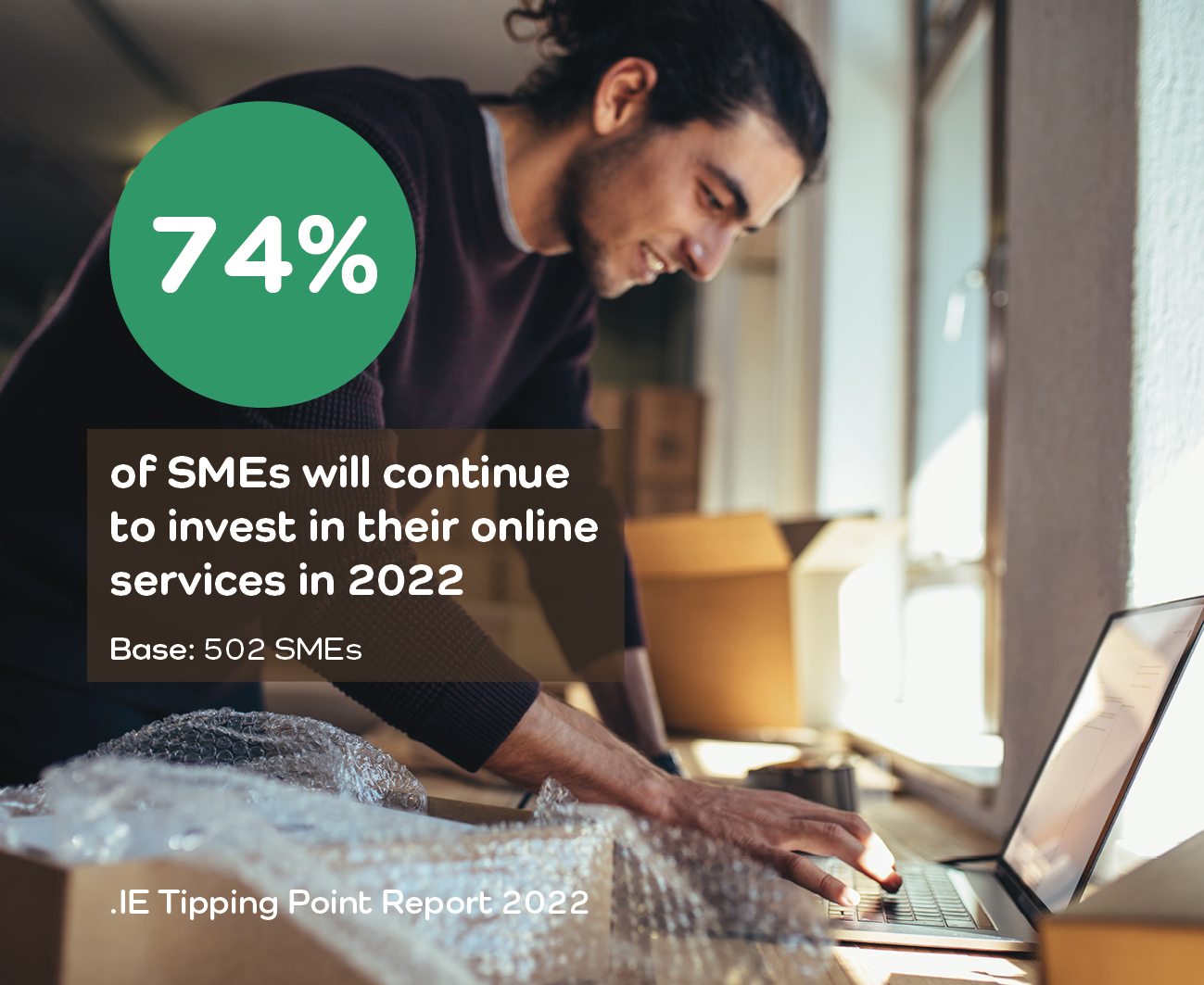Blog | 6 in 10 SMEs take no particular steps to protect customer data online or don’t know how to
As many as 6 in 10 Irish SMEs do not take any particular steps to protect customer data or don’t know how to, despite 75% of consumers saying that they are ‘very’ or ‘somewhat concerned’ about the security of their personal information when shopping online.
Just 15% of SMEs said they use a firewall or antivirus software, while only 11% use two-factor authentication. Just 4% said they trained staff in cybersecurity best practice.
The findings were revealed today in our new research report .IE Tipping Point 2022: Irish e-commerce and digital business in the post-Covid era, published in partnership with Digital Business Ireland. The report is the third and final part of a trilogy of research that has examined consumer and SME attitudes and adaptations to the pandemic over the past two years.
‘While it might be tempting for a small business to postpone investing in anything that doesn’t lead to a measurable return in the here and now, a cyberattack can be immediately devastating and lead to permanent erosion of customer trust,’ said David Curtin, Chief Executive of .IE.

‘We know from the HSE ransomware attack in 2021 how a small error can lead to the crippling of critical infrastructure. Similar incidents among businesses are increasingly common, yet most are entirely avoidable with good security hygiene by staff and the use of basic cybersecurity tools, such as antivirus software and a password manager.’
Preparing for the post-Covid era
While Ireland is now free of virtually all Covid restrictions, there won’t necessarily be a rapid return to the normal economy of pre-pandemic 2019. The pandemic, directly and indirectly, through digital technology and changed sociocultural priorities, has altered many consumer and business behaviours.
The .IE Tipping Point report shows that the pandemic has accelerated Ireland’s move towards cashlessness. 62% of consumers said they were using cash ‘significantly’ or ‘somewhat less’ since the start of the pandemic.
Surprisingly, increasing cashlessness is universal among all generations—and older people are now the least cash friendly. 66% of Baby Boomers (born 1946-1964) said they were using cash less often, compared to 58% of Gen X (1965-1980) and 62% of older Millennials (1981-1990).
Despite this, as many as 25% of all Irish SMEs still only accept cash payments, a figure that rises to 35% among businesses with 1-5 employees and 38% among SMEs with a premises in Dublin.
Sustainability and the environmental friendliness of a business’s product and supply chain remain a priority for consumers. Almost 80% said it is ‘very’ or ‘somewhat important’ that the product they order online is produced and delivered in a sustainable way, a figure that rises to 90% among younger Millennials (1991-1996).

The Covid consumer
55% of all consumers will prioritise online shopping in 2022: 16% will do most of their shopping online, while 39% said they will shop for necessities in-store, such as groceries, but buy most other things online. 45% of all consumers plan to do most of their shopping in-store.
‘Consumers in the post-Covid era will be driven by convenience, ease of use, and experience, said Mr Curtin
Just as many of us now value the flexibility of hybrid working, we also value hybrid shopping. We enjoy the experience and the convenience of in-store shopping while simultaneously valuing the ease and speed of e-commerce.
‘We gravitate towards retailers that give us the best of both worlds.’
Digital-first shopping preferences are particularly apparent among younger consumers. Just 29% of Millennials will do most of their shopping in-store in 2022 (compared to 45% of the total sample) while 33% of Gen Z consumers (born 1997-2012) will do most of their shopping online (compared to 16% of the total sample).
‘Irish SMEs need to be aware of the different shopping preferences among the digital native generations, particularly as economic purchasing power shifts to them in the coming years. Businesses that do not cater to these needs or offer a compelling online experience will simply lose out to their competitors at home and abroad,’ said Mr Curtin.
Consumers continue to view international retailers as more competitive on price and range, but they consider Irish SMEs to be more trustworthy and more reliable and to have better delivery services.

The Covid SME
Exactly three-quarters of SMEs have a website. Just over a third (34%) have an online store—of that figure, 8 in 10 sell directly through a store on their own website.
Half of SMEs have invested in their online presence since the start of the pandemic. In the majority of cases, this has resulted in improved sales. Among investing SMEs, 30% said they are busier than before the pandemic and 36% have been able to maintain the same level of pre-pandemic business.
Just over half (54%) of SMEs are planning a significant digital investment in the next 5 years, with most focusing on launching a new website (23%), improving their existing one (15%), or building a dedicated app (13%).
Further insight
‘Our research shows that a tipping point in Ireland’s attitude to digital business and e-commerce has indeed been passed,’ said Mr Curtin. ‘Consumers have fully embraced the convenience of online shopping. In response, SMEs were forced to adapt, digitally and increasingly attitudinally, by transforming their static websites into e-commerce hubs and prioritising investment in their online stores.

‘While an increasing number of SMEs are now selling online with modern e-commerce software, which is very positive, digital investment must be a proactive and sustained part of business spending.’ said Mr Curtin
Digital change is constant and rapid, and Irish businesses should be careful to avoid stagnation. International retailers will be more than eager to snap up Irish customers frustrated with a lack of innovation at home.
Lorraine Higgins, Secretary General of Digital Business Ireland, said: ‘Prior to 2020, SMEs were slow to embrace the potential of a fully integrated e-commerce website. Public health restrictions soon dictated the need for businesses to rely on their digital operations and, as a result, many SMEs began to pivot online for the very first time. This transition was coupled with the enhancement of businesses’ payment functionality, affording consumers a cashless experience.
‘Evidently, consumers have become accustomed to the convenience and flexibility offered by cashless payments, and businesses across the country have been steadfast in their response because robust payment infrastructure helps to keep Irish SMEs competitive in the global digital marketplace.’
For further information, visit our .IE Tipping Point page where you can download the full report.
Naomi Temple is our Marketing Specialist working within our corporate communications team.